- Home
- Mark Wayne McGinnis
Ricket (Star Watch Book 2) Page 4
Ricket (Star Watch Book 2) Read online
Page 4
She didn’t answer. The truth was, he didn’t know Hanna all that well, even after two months. What started off as a whirlwind romance in their first few weeks together had suddenly quelled … had changed to a strictly business relationship. He’d been aware she had been wrestling with something, even conflicted, but she didn’t want to talk about it. And perhaps that was for the best. After all, he wasn’t a damn shrink. If she wanted to discuss some personal issue, she could very well make some effort to do so.
They did work well together and she was far more competent than most men he’d partnered with, in some business ventures, over the last few years. He tried to think of the best word to describe her … was it cunning? Perhaps that was too harsh. No, cunning actually did fit her cool and detached demeanor. He’d witnessed her ability to manipulate others, mostly males, with a feigned vulnerability when dealing with arrogant, domineering types—such as dignitaries or officials. But she could just as easily bring her sexuality into play. Leon had also witnessed her flirty side—watched as unsuspecting potential adversaries were drawn into her web, becoming putty in her hands. Had he too been manipulated? Had she become bored with him once the conquest was made? Or, perhaps it was the complete opposite … his aloof go-with-the-flow attitude had driven more than a few women to distraction. He’d been told more than once he wasn’t relationship material … whatever that meant.
“I’m sorry,” she said. Her voice was so faint he wondered if he’d heard her correctly.
He brought his head closer to the bulkhead.
“I’ve had some issues to contend with … internal stuff … are you there?” she asked.
“I’m here.” Now she wanted to talk. He could see how their separate confinement cells made it easier for her. The wall … the isolation. “Stalls?”
“Yeah … that and other things. My brother getting killed started it all. Forced me to take a different look at my life. Who I was … where I was going.”
“You can go wherever you want, Hanna, that’s the good news. If you want, I’ll take you … or you can set off on your own. It’s nice having choices.”
Leon waited for her to answer, then wondered if she’d already stepped away.
“Sorry about your ship,” she said. “I know how you loved her … the SpaceRunner.”
“Yeah, well that bastard out there owes me a new ship. I figure this one will do just fine.”
He heard her laugh on the other side of the wall.
“Then hurry up and get us out of here,” she said.
* * *
Surprisingly, Ricket was given free rein to roam the Caldurian vessel at will. He wondered, at first, if he should take offense at that. Was he so inconsequential a threat, compared to Hanna and Leon, that the Caldurians felt there was no need to incarcerate him? But he did determine that wasn’t it at all: They needed him for something and they needed him to do it willingly.
This vessel, Ricket learned, was called the Parcical and she was actually larger than he’d first estimated, about the size The Lilly had been. It had five primary decks and several sub-decks. He currently sat on Deck 4, toward the ship’s stern, where the confinement cells were located—as well as a small laboratory and the ship’s Medical facility, including four advanced MediPods—and another compartment, which Ricket hadn’t yet figured out. The ship was roughly shaped like an egg and there was much to catch the eye since almost everything solid was actually virtual … simulated matter. That gave some things—like bulkheads, consoles, and some of the deck plating—a soft radiating glow. The effect was almost ethereal and Ricket found it quite soothing.
The craft would easily hold several hundred, but there was but a mere skeleton crew presently manning the ship … a number he estimated to being fifteen total Caldurian crewmembers—although there were several dozen security forces on board. Hobel, their commander, held the officer’s title of Omni, equivalent to the rank of Captain and sometimes Admiral on Earth.
At present, both Leon and Hanna were asleep in their respective cells. Ricket had seen the hostility in their eyes, figuring—since he was free to come and go as he pleased—that he had probably changed allegiance, maybe in order to save his own hide. That’s fine, let them think that, Ricket thought. Until he had things figured out, he needed the freedom to investigate, and he needed access to Hobel … the one with all the answers.
A noise behind him had Ricket look back. He recognized Norwell, his own equivalent of a science, or technical, officer on board the Parcical. He was a pleasant enough Caldurian, but a bit too chatty for Ricket’s liking.
Norwell stopped in the corridor and held out an open palm. “Would you come with me, Ricket?”
“What is it you require, Norwell?”
“Nothing to be afraid of; this way, to my workshop.” He was old—perhaps one hundred and ten or twenty, which even for a Caldurian was pretty old. He was stooped and shuffled his feet as he walked. Ricket caught up to him just as he meandered into a nearby DeckPort. He knew the old Caldurian’s workshop was on Deck 2 and he emerged onto that deck, nearly walking into the ever slow-moving Norwell.
Ricket hadn’t entered the workshop before for it was one of the few off-limits compartments. Seeing it now, Ricket was reminded of his own workshop on an upper deck of the Minian. Here, too, countertops were strewn with an assortment of devices and contraptions of varying sizes. Ricket was like a child in a candy store. It was almost too much to take in; he turned and saw something familiar lying across the furthest worktable—Trommy5.
“You have the mecher here,” Ricket said.
Norwell joined Ricket at the robot’s side. A cavity at the top of its head exposed a myriad of circuitry inside.
“Interesting … you’ve removed its primary personality tab,” Ricket said.
“Terrible design. These bots are unstable … surprised they can stay up on their feet at all.”
Norwell shuffled over to the middle of three large, wall-mounted devices. Ricket knew they were smaller versions of the phase synthesizer device located on the Minian. Norwell waved a hand in front of the device and the three separate-looking devices merged into a single larger version. A virtual door opened, exposing a small compartment about the size of a standard home oven. Inside it sat something metallic and oblong. Norwell reached forward but suddenly stopped himself.
“Would you … please?”
Ricket stepped in close and reached in to retrieve the item for Norwell. Once he had it firmly in both hands, he hefted it out and stood there. “Where do you …”
“Oh … sorry, Ricket. Here, place it right here, next to the mecher.”
Ricket did as asked and set the heavy item onto the workbench. Not having a flat side, it wobbled around a bit. “Why did you completely reproduce a new head?”
Norwell tilted his own head as he looked down at his handiwork. It was an identical mecher head.
“Easier to start from scratch than repair or modify inferior designs.” Norwell used a tool on the workbench to pop the top of the newly manufactured head. He found a tiny thumbnail-sized card, or tab, on a raised shelf and placed it into the circuitry of the newly created head. He then brought his attention over to the original mecher, and, using another tool, loosened a restraining clamp on its neck area and lifted the head away, then placed it down onto the workbench.
“Please hand me the new head, Ricket.”
Ricket again did as asked and watched as the old scientist configured the new head onto the mecher body with surprising dexterity.
Norwell reached across to the far side of the metal body and depressed a somewhat hidden button there. The mecher’s eyes came alive, turning yellow. Ricket watched as the robot went through its internal initialization routines, then processed its current environment. After running through a quick threat assessment, it was ready to be commanded.
“Sit up, Trommy5,” Norwell commanded.
The mecher used its arms to sit up, while letting its legs swing down.
&
nbsp; “I feel different,” Trommy5 said.
“I should think so. Much of your processing and micro-interface has been upgraded. You’re smarter and more nimble. Why don’t you hop down from there and walk around for us?”
Trommy5 did as told, landing with a heavy thump onto the deck, with neither a teeter nor a wobble. The robot then proceeded to move about the workshop with an ease and fluidity uncommon for even the most sophisticated bots. “I feel different!”
Norwell and Ricket exchanged glances. “Perhaps saving the personality tab was an error in judgment,” the Caldurian scientist said with a slight smile.
“Ricket … can you tell me where Captain Pike and Miss Hanna are located? I would like to show them my new capabilities.”
Norwell interjected, “They are resting, Trommy5. They are not to be disturbed. You are not to leave this workshop unless given permission by either me or Omni Hobel.”
It was then Ricket realized Trommy5 had just been configured with Caldurian NanoCom tech. Ricket, peeking into the mechanical being’s neural network, checked to see if its admin-level programming had been secured. It hadn’t been … everything was still in an unlocked mode. He glanced over to Norwell, who was disposing of the older mecher head into what Ricket surmised was an access panel that led to an incinerator.
“What will you do with it?” Ricket said.
“The bot head?”
“Yes.”
“Probably phase-shift it into the MicroVault.”
Ricket was familiar with the technology. Virtually anything could be phase-shifted into one of the vaults, nearly microscopic in size, and stored in there indefinitely. On a vessel as small as this one, adequate storage space was at a premium. By placing items—some as large as the ship herself—into the onboard MicroVault, they could be accessed as needed or required without taking up any space.
“Is that what you’ll do to me and Captain Pike and Miss Hanna?”
The question seemed to discombobulate the old science officer. While he continued putting his tools away, and moving things from one location on the workbench to another, Ricket could hear him muttering to himself. Finally, he said, “I would not do that. I have spent sixty-five of your years searching for you. You, Ricket … are my inspiration.”
Ricket didn’t know how to respond to that—how to address such a bizarre comment. So he didn’t try. “And Leon and Hanna?” But Ricket had already figured that much out for himself; they were being held captive as insurance. Insurance that Ricket would do as he was asked. What he hadn’t known, up until that moment, was that it was Norwell who had incited the kidnapping. The whole setup was his doing. But why?
“They need to be released at once, Norwell.”
“That is not possible. They will eventually be placed into stasis and stored in the MicroVault.”
“No. I will not help you this way … I will self-destruct … I will overload my neural interface. A simple process.”
That got Norwell’s complete attention. “You would not do that … I don’t believe you.”
Ricket remained expressionless. “Why don’t you tell me what you need from me? Why you have gone to so much trouble.”
“I thought that was explained to you.” Norwell faced Ricket and suddenly he looked all his years. “As advanced as Caldurian technology has become, there is one technology that has eluded us. Without the ability to fully understand and master that technology … our Caldurian way of life is in jeopardy.”
Ricket did his best to digest Norwell’s comments, then it hit him—the Zip Farms. The Minian, and most other Caldurian vessels, used them as a means to travel into the multiverse. This technology was developed on Alurian, a planet in the Corian Nez constellation system, one hundred and thirty light-years from Earth. Caldurians had only discovered the technology eighty-nine years earlier. A vessel the size of the Minian required a number of Zip accelerators—the locomotive-sized pieces of equipment which made up a Zip Farm.
“I’m confused,” Ricket said. “The Caldurians have countless vessels, moving in and out of the multiverse … surely, you have mastered a way to reproduce this technology. How else—”
“Originally, we came into possession of twelve Alurian ships of varying sizes. And, like you said, we simply cloned the ships’ Zip accelerators … creating varying-sized Zip Farms as needed.”
“So what’s the problem now? Are they no longer working correctly?”
“They work perfectly. That is not the issue. It’s the interface to the multiverse itself. It has been altered … whether by natural, or some other means, we are unsure. What we do know is that we no longer have the proper key to unlock the passageway into the multiverse realms …”
“So you’re saying all Caldurian vessels are marooned within their current realms? Including this one?”
“That is correct.”
“Are you the only one … trapped here?”
“Oh, no … there was enough time for a small fleet of Caldurian ships to transport into this realm … our home realm. We are in transit to rendezvous with them, as we speak.”
Ricket was getting a bad feeling. “What is the fleet doing here … what is their objective?”
“I believe the answer lies within a Caldurian ship … one with one of the original Alurian Zip Farms. Obtaining this ship will be a requirement before we can begin work. The fleet will commandeer that ship—and by force, if necessary.”
Ricket connected the dots. “The Minian.”
Chapter 6
Mansan Core System
The Assailant, Gymnasium
__________________________
Boomer, stretched out on her back with her arms over her head, stared up at the ceiling. She heard a string of swear words coming from her left.
“I had this working perfectly fine back on the Minian … why didn’t you just leave it alone?”
Boomer turned her head and saw Bristol, working across from her in the gym compartment, crouched down next to the portable hologram projector-thingy. She tried to remember what he’d called it.
“What’s that thing called again?” she asked.
“It’s just a projector,” he answered irritably.
She made a face at him. Boomer was sure he’d called it something else, a more complicated-sounding name. “Are you almost done?”
Bristol sat cross-legged on the mat, an open toolbox at his side. The projector-thingy lay in several pieces on the mat and she wondered if he’d be able to put it all back together again. She was already late for her meeting, and said, “It’s not very sturdy. Shouldn’t you be able to carry the thing from one place to another without it breaking apart?”
“It’s delicate. It needs to be handled gently … you must have banged it on something.”
Actually, she had. She’d bashed it entering a DeckPort on the Minian. It was just a glancing blow, but she thought she’d heard something come loose. “I’ll be more careful from now on.”
Bristol fitted the final piece onto the projector and secured it with two screws. He flipped a switch—instantly, a bright blue, glowing, quasi-transparent sphere encircled the projector, as well as Bristol. The holographic image was distorted by Bristol’s disruptive presence.
Boomer jumped to her feet and clapped her hands. “You did it! I love you, Bristol!”
She saw movement in the hologram. “Ah, can you step outside of the sphere, Bristol?”
“You mind if I get my toolbox first?” he snarled, making sure he slammed its lid shut as loudly as humanly possible. He hefted it up and stepped away from the hologram. Both Bristol and Boomer observed the bearded man, now standing patiently before them. He wore a tan Shadick—the simple loose-fitting nomad’s attire a Tahli warrior master wore. A single blue circle could be seen on both his sleeves, indicating he was a Master of the First Degree: a feat taking twenty years, or more, to accomplish. There were three levels a Tahli warrior master could aspire to in the art of Kahill Callan: Master of the First Degree … M
aster of the Second Degree … and Master of the Third Degree. He bowed toward Boomer and nodded his head in the direction of Bristol. Bristol returned a quick wave of his hand and left without another word.
Boomer bowed, then straightened. “May I approach, Master Sahhselies?”
He smiled, bringing up his enhancement shield, and assumed the Kahill Callan defensive stance. “You will attack first, Boomer … remember what you learned last time. Do not make the same fatal mistake.”
She sprang up, and forward—the shield strapped to her left forearm angled toward her opponent. She had progressed to the point she could utilize the shield to do multiple things at once. Its curved three edges emanated their own unique distortion waves, which she used to help propel herself higher into the air; the front, or face, of the shield initiated the powerful energy weapon that looked similar to a bright plasma beam, but actually were highly concentrated distortion waves, which the one wielding the shield could influence through mental kinetic manipulation. The more skilled the wielder of the shield, the more powerful, and accurate, were the weapon’s uses.
Boomer was a natural with the shield. Over the last few months, she’d advanced in her training to a point she now found frustrating. She had little problem defeating any of the Kahill Callan masters presented to her by Prince Aahil Aqeel. He had been nearly killed in a spectacular battle recently, against Lord Vikor Shakrim. Eventually, Shakrim was bested, but Prince Aqeel’s injuries were serious enough to require him months of convalescence. Up until now, Boomer had yet to be trained by a more skilled opponent than Master Aqeel.
Master Sahhselies’ holographic form moved swiftly within the confined space. Like Boomer, he too was using a practice enhancement shield. He dodged her advance and struck his shield forward in three quick thrusts. Boomer easily blocked the incoming waves, spun around, and delivered a back-spinning heel-kick high enough to cross through the master’s chin. A blow that would have put him onto his back had her kick not been virtual and holographic. He countered quickly with his own forward kick, followed by two more kicks—one low, toward her exposed front knee, then one high up, close to her right ear. She blocked both with her shield—seeing the blows coming—and already formulated a reprisal before he’d completed his maneuvers. Is that the best you can do? Boomer thought impatiently.

 The Hidden Ship
The Hidden Ship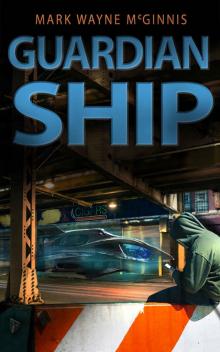 Guardian Ship
Guardian Ship Cloudwalkers
Cloudwalkers Mad Powers (Tapped In)
Mad Powers (Tapped In) Ship Wrecked
Ship Wrecked The Great Space (Scrapyard Ship Book 6)
The Great Space (Scrapyard Ship Book 6)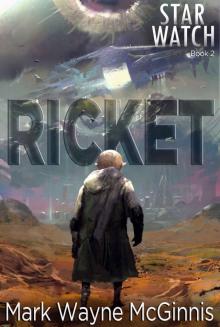 Ricket (Star Watch Book 2)
Ricket (Star Watch Book 2)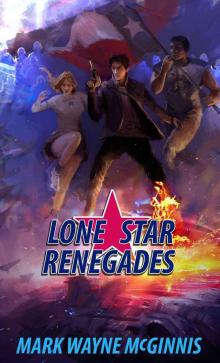 Lone Star Renegades
Lone Star Renegades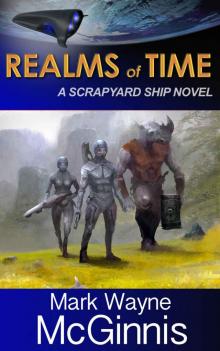 Realms of Time (Scrapyard Ship)
Realms of Time (Scrapyard Ship) Glory for Sea and Space (Star Watch Book 4)
Glory for Sea and Space (Star Watch Book 4) Scrapyard Ship 3 Space Vengeance
Scrapyard Ship 3 Space Vengeance Boy Gone
Boy Gone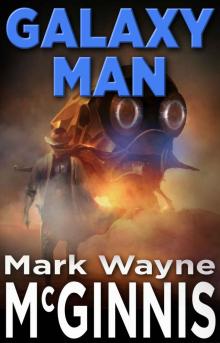 Galaxy Man
Galaxy Man Scrapyard Ship
Scrapyard Ship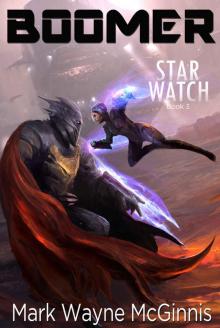 Boomer (Star Watch Book 3)
Boomer (Star Watch Book 3)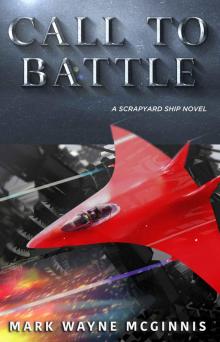 Scrapyard Ship 7: Call to Battle
Scrapyard Ship 7: Call to Battle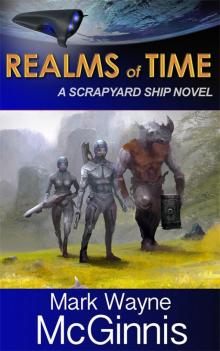 Scrapyard Ship 4 Realms of Time
Scrapyard Ship 4 Realms of Time Star Watch
Star Watch The Simpleton QUEST
The Simpleton QUEST The Simpleton: An Alien Encounter
The Simpleton: An Alien Encounter Scrapyard LEGACY (Star Watch Book 6)
Scrapyard LEGACY (Star Watch Book 6) Ship Wrecked: Stranded on an alien world
Ship Wrecked: Stranded on an alien world